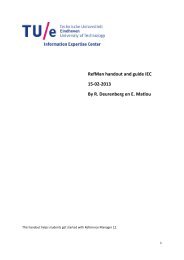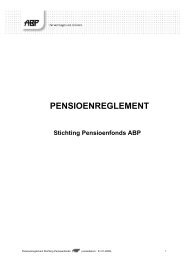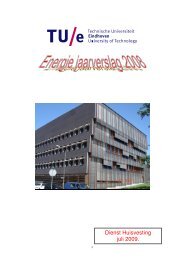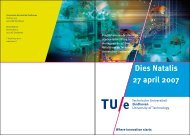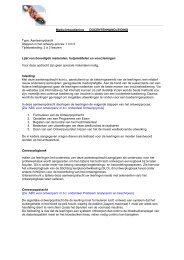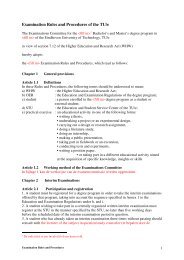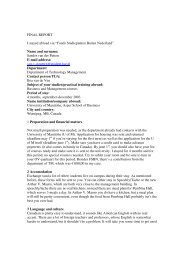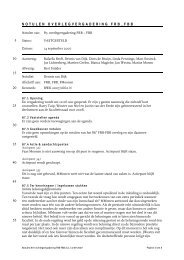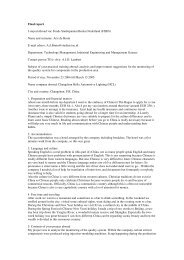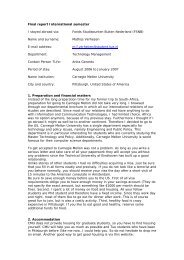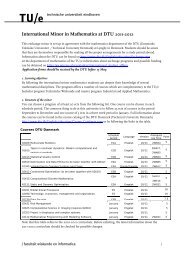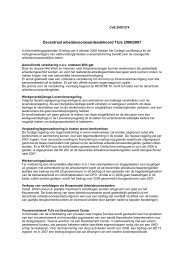Final report
Final report
Final report
Create successful ePaper yourself
Turn your PDF publications into a flip-book with our unique Google optimized e-Paper software.
None of the courses are taught in Eindhoven, and I think they were a very valuable supplement to<br />
the ones I already did. I really appreciated their contents and the quality and profoundness of the<br />
material. Disappointing were the quality of the teaching and the clarity of the lectures (probably due<br />
to my expectations and language problems on part of the professors), and the logistics, i.e.<br />
communication of timetables, room numbers, changes, etc.<br />
The system is also different from that in Eindhoven. Bocconi works with a scoring system of<br />
0…30, and 30 with honours. To pass a course, you need at least 18 credits. I found that it is almost<br />
impossible not to pass a course. In fact, about a third of the exams are passed with grades equal to<br />
or higher than 28, which is equivalent to at least 9.3 in terms of Dutch grades. And while it is<br />
virtually impossible to pass a Dutch subject with a 10, it is considerably easy to pass an Italian<br />
subject with 30.<br />
Another difference is that students can choose how they want to be examined, distinguishing<br />
between attending and non-attending students. Almost all courses have an obligatory exam. But<br />
where the non-attending students have to study for instance only five books, attending students only<br />
have to study one. But attending students always have additional group work, assignments, papers<br />
and presentations (which non-attending students do not have to do) that contribute to the final<br />
grade. Basically it is a choice between a more practical and theoretical course; the amount of time<br />
spent is about the same for both. The advantage for non-attending students is that they do not<br />
necessarily have to go to class – and thus may follow two subjects at the same time. But they miss<br />
the practical training. For attending students, particular challenging is the group work, especially if<br />
there are Italians in the group. While Dutch students prefer to divide tasks and work individually,<br />
Italians always work in a group behind one computer, discussing together about every aspect of the<br />
assignment. In one class I had group work with only Italians and found it very frustrating to be at<br />
the university from eight in the morning until six in the evening and not having written even more<br />
than one paragraph, and this continued for weeks. To me this was highly inefficient, but as I was<br />
not in the position to change it. Nonetheless, I regarded these projects, also with students of other<br />
nationalities, as a highly valuable experience.<br />
I also did my graduation project at Bocconi, at the Centre of Research on Innovation and<br />
Internationalisation (Cespri) of Professor Franco Malerba. Although it was really an honour to be<br />
able and to my research with that group, I found it disappointing that graduation students are not<br />
involved in their activities and neither do they get a place to work (which I was told is very<br />
uncommon in Italy). So except for the usual contacts with my thesis supervisor, I had to work either<br />
at the library or at home. In terms of literature on economics, business, law, and innovation, the<br />
library is excellent. They have virtually no resources, however, on engineering, which I found<br />
disappointing considering the fact that this university does a lot of research on innovation. Another<br />
disappointment is that actually working in the library is very difficult. It is very noisy and you are<br />
not allowed to use a laptop – there are no Internet connections anyway. Because there are<br />
practically no other places where one can work undisturbedly, I was forced to work at home.<br />
Fortunately I had a quiet apartment and a desk, but most exchange students do not have this luxury.<br />
6. My best experience<br />
The thing I liked best about my stay in Milan was the lively, international atmosphere. In fact, I<br />
think it is the most European Italian city; the Milanese have a different mentality than the rest of<br />
Italy. It is the financial and fashion centre of Italy and there are really a lot of people from different<br />
nationalities. And although Milan is not really a student town – and it surely is not the most<br />
beautiful city in Italy – it is a city that never sleeps, offering many opportunities for entertainment<br />
and sports. And it offers many opportunities for those who want to follow courses or pursue a<br />
career.



